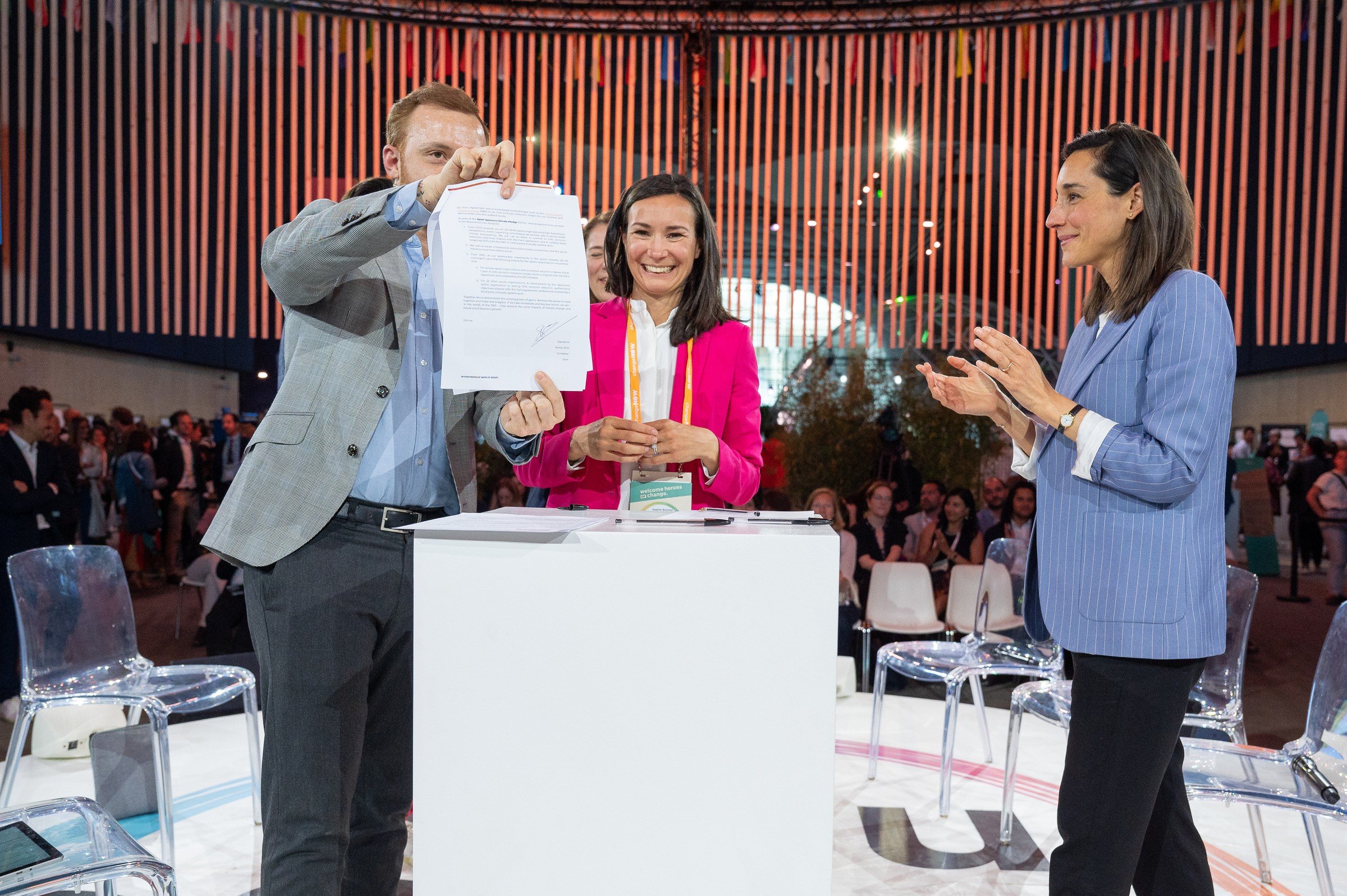GAME ON FOR ALL: SPORTS DRIVING AWARENESS AND ACCOUNTABILITY IN A REGENERATIVE ECONOMY
INDUSTRY
© IMAGO
Inspired by Paul Hawken's vision in Regeneration: Ending the climate crisis in one generation, we've launched "Regeneration Revolution: Sport’s Solutions to Helping End the Climate Crisis." This series highlights how sports can be a dynamic force in addressing the climate crisis, with a keen focus on the nine core areas explored in Hawken's book: Cities, Food, People, Energy, Industry, Forests, Land, Wilding, and Oceans.
Currently, every industrial system is extractive, and therefore degenerative. Hawken emphasizes that the external impacts of industry, including pollution, poverty, loss of biodiversity, and advertising, all cause harm to both people and the planet.
Hawken argues that solutions need to be looked at holistically with individuals and big industry across all sectors — big food, healthcare, banking, plastics, clothing, etc. — working together toward a regenerative economy that benefits all.
HOW IS THE SPORTS
INDUSTRY RESPONDING?
This section of Hawken’s book brings together complex systems covering a range of industries, each of which are individually illustrated through the other blogs in this content series. You can dive deeper into how the sports industry is playing its part in the areas of cities, food, people, energy, forests, land, wilding, and oceans here.
There are strong examples, however, of how sports are standing up to big industry as a whole and calling for change. This prompts difficult questions, such as whether a prohibition on sponsorship in certain extractive categories should be made mandatory. Tackling an industrial system is no simple task, but the sports industry is well positioned to reach a broad audience and drive change.
CLIMATE COUNCIL CREATES VOLUNTARY CODE TO END FOSSIL FUEL SPONSORSHIPS
In May 2023, the Climate Council in Australia launched a voluntary code, #CallTime, for sports organizations and art institutions to advocate for the removal of fossil fuel sponsorships from their events and stadiums.
Organizations can sign the pledge to help build momentum against fossil fuel sponsorships and send a strong message to their members, fans, and the wider Australian community that they are serious about tackling climate change.
Organizations who sign the pledge get access to information demonstrating the impact of climate change on Australian sports, arts, and public events, as well as a step-by-step guide to evaluate their sponsorships in alignment with their commitment to the code.
Alongside ChangeNOW, 17 Sport launched the Sport Sponsors Climate Pledge in May 2023 to ignite real, sustainable change within the sports industry.
With the support of first signatories Accor, EDF, Orange, and Sodexo Live!, the pledge brings together forward-thinking, socially responsible organizations and athletes from the international sports industry who are committed to making a positive impact on our planet.
The aim is to go beyond carbon neutrality to shift mindsets toward reduction, holding both sponsors and sports organizations accountable. We believe that by connecting financial support with carbon reduction efforts, we can create a significant and lasting impact in the world of sports.
BRENTFORD CONTINUES WITH THE SAME HOME KIT
Instead of creating a new home kit for the 2022-23 season, as is customary for Premier League football teams, Brentford elected to stick with their current kit for another season for sustainability reasons and to show solidarity with fans by helping make football more affordable for them.
© IMAGO
ELIMINATING JUNK FOOD BRANDS FROM SPORTS
Bite Back’s sponsorship of the UK football team Dulwich Hamlet draws attention to the hypocrisy of junk food brands aligning with sports.
This sponsorship was used to encourage other teams, athletes, and events to use their influence for good by advocating for healthier food options and calling for the elimination of junk food from any association with sports.
FC BARCELONA LAUNCHES ITS FIRST NFT COLLECTION IN ASSOCIATION WITH PLASTIKS
FC Barcelona and Plastiks have partnered to tackle plastic waste and promote sustainability. Their collaboration aims to recover 1,000,000 kilograms of plastic, equivalent to 35,000,000 one-liter bottles, while avoiding the use of 800,000 liters of oil.
To engage their global community, FC Barcelona introduced an exclusive collection of NFTs called "Unleash Your Passion," featuring 3,000 animal-themed digital art pieces.
Each NFT acquisition contributes to removing 35,000,000 kilograms of plastic from the planet, aligning sports, technology, and environmental responsibility in a powerful way.
WHAT CAN WE TAKE AWAY FROM THIS?
Redesigning an industry as broad as the world of sports is no simple task. At 17 Sport, we see the power this transformation can have.
Here are our top five takeaways for how sports can take action for lasting change:
Collaborative Action Across Industries:
Embrace the idea that solutions need to be looked at holistically, with individuals and big industry players across various sectors working together toward a regenerative economy. Sports has the unique advantage of attracting the interest of multiple industries, allowing sports leaders to actively engage with stakeholders from industries such as food, healthcare, banking, plastics, and clothing to collectively promote regenerative practices that benefit people and the planet.
Holding Big Industry Accountable:
Recognize the role of the sports industry in standing up to and calling for change from big industry players. Initiatives like the Sport Sponsors Climate Pledge demonstrate that sports organizations can foster sustainable change within the industry by connecting financial support with carbon reduction efforts and holding sponsors and organizations accountable.
Advocating for Healthier Choices:
Use the influence and reach of sports to advocate for healthier choices, such as eliminating junk food brands from sports partnerships. Aligning sports with health-conscious initiatives can send a powerful message and contribute to public well-being.
Sustainability Over Tradition:
Consider the sustainability impact in decisions. As seen with Brentford's choice to continue using the same home kit for an extra season, sports organizations can prioritize sustainability over tradition to play their part in promoting a better future.
Promoting Environmental Responsibility:
Partner with organizations that share environmental responsibility goals. Collaborations like FC Barcelona and Plastiks' initiative to tackle plastic waste and promote sustainability demonstrates how sports organizations can leverage their global reach and fan engagement to drive change, especially in partnership with organizations focused on environmental conservation.
When we call out major players in the industry and take steps toward change on our home pitches, fields, and courts, our potential to keep generating positive progress grows.
ABOUT 17 SPORT
17 Sport exists to help businesses use the power of sport to build a more positive future for the world whilst accomplishing commercial goals.
Founded in 2020, our name is inspired by the United Nations’ 17 Sustainable Development Goals, and is anchored to SDG 17 and our profound belief in the power of partnerships. Based in 7 different countries on 3 continents, our global team of experts comprises individuals who have been at the forefront of the purpose revolution in sports and business for the last 15 years.
To find out how 17 Sport can help you activate your purpose through sports to help address the climate crisis, reach out to info@17-sport.com for a one on one consultation with one of our experts.



